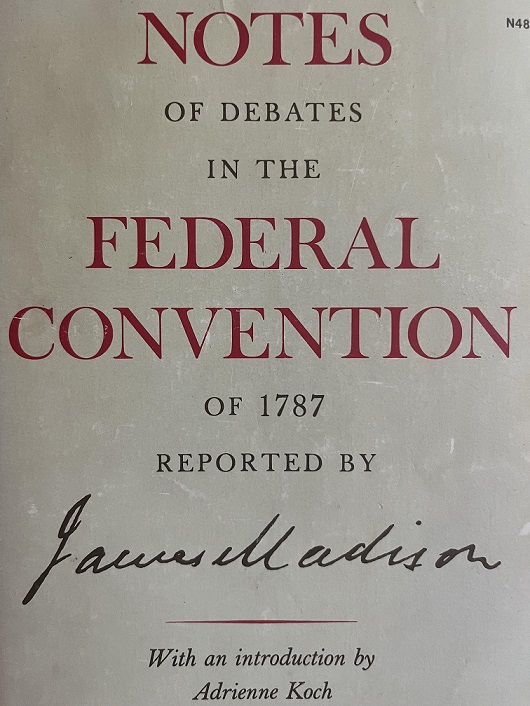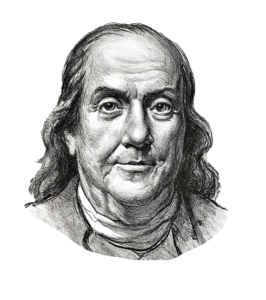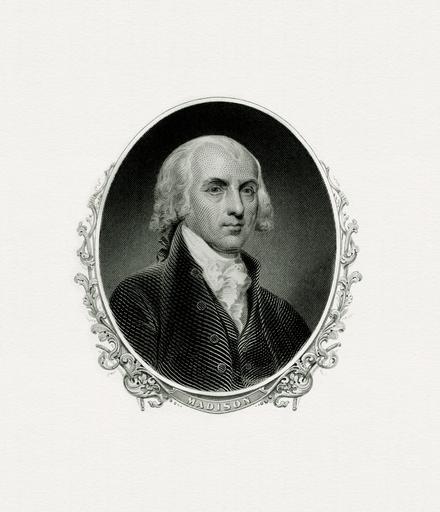 James Madison, 4th American President, plays a leading role in Blow Out the Light. I first encountered serious American history in my second year of college. California State University, East Bay offered a two semester American History class. The main text for this two-part class was the almost 700 page “Notes Of Debates in the Federal Convention of 1787 Reported by James Madison.” Madison came to be known as the “Father of the Constitution” for the leadership role he took at the Convention. He worked hard to prepare himself. This included contacting his friend and fellow Virginian Thomas Jefferson, who was serving as the American Minister to France, and asking him for a recommendation of the books he should read to prepare himself. Jefferson not only recommended dozens of books, but also shipped many of them to Madison from Europe. This helped to make Madison the best prepared attendee at the Convention, as well as helping him with future tasks including writing Federalist Papers and the Bill of Rights. At the time of events in Blow Out the Light, Madison is serving as a Representative for the state of Virginia at the new Federal Congress in New York. There, he will also write the first speech delivered by President George Washington. As a leader in the House of Representatives, Madison focused on the issues of the day. These included how to pay off the war debt which pitted states that had paid their debt against those who had not, finding the best location for a new federal capital city, and the ongoing challenge of slavery. If you’d like to learn more about James Madison, you can visit Montpelier, Madison’s lifetime residence. Montpelier is about 35 miles from Richmond, Virginia. Contact Montpelier: Online at Montpelier.org, and by phone at (540)672-2728 x460.
James Madison, 4th American President, plays a leading role in Blow Out the Light. I first encountered serious American history in my second year of college. California State University, East Bay offered a two semester American History class. The main text for this two-part class was the almost 700 page “Notes Of Debates in the Federal Convention of 1787 Reported by James Madison.” Madison came to be known as the “Father of the Constitution” for the leadership role he took at the Convention. He worked hard to prepare himself. This included contacting his friend and fellow Virginian Thomas Jefferson, who was serving as the American Minister to France, and asking him for a recommendation of the books he should read to prepare himself. Jefferson not only recommended dozens of books, but also shipped many of them to Madison from Europe. This helped to make Madison the best prepared attendee at the Convention, as well as helping him with future tasks including writing Federalist Papers and the Bill of Rights. At the time of events in Blow Out the Light, Madison is serving as a Representative for the state of Virginia at the new Federal Congress in New York. There, he will also write the first speech delivered by President George Washington. As a leader in the House of Representatives, Madison focused on the issues of the day. These included how to pay off the war debt which pitted states that had paid their debt against those who had not, finding the best location for a new federal capital city, and the ongoing challenge of slavery. If you’d like to learn more about James Madison, you can visit Montpelier, Madison’s lifetime residence. Montpelier is about 35 miles from Richmond, Virginia. Contact Montpelier: Online at Montpelier.org, and by phone at (540)672-2728 x460.
My Love of American History
 James Madison, 4th American President, plays a leading role in Blow Out the Light. I first encountered serious American history in my second year of college. California State University, East Bay offered a two semester American History class. The main text for this two-part class was the almost 700 page “Notes Of Debates in the Federal Convention of 1787 Reported by James Madison.” Madison came to be known as the “Father of the Constitution” for the leadership role he took at the Convention. He worked hard to prepare himself. This included contacting his friend and fellow Virginian Thomas Jefferson, who was serving as the American Minister to France, and asking him for a recommendation of the books he should read to prepare himself. Jefferson not only recommended dozens of books, but also shipped many of them to Madison from Europe. This helped to make Madison the best prepared attendee at the Convention, as well as helping him with future tasks including writing Federalist Papers and the Bill of Rights. At the time of events in Blow Out the Light, Madison is serving as a Representative for the state of Virginia at the new Federal Congress in New York. There, he will also write the first speech delivered by President George Washington. As a leader in the House of Representatives, Madison focused on the issues of the day. These included how to pay off the war debt which pitted states that had paid their debt against those who had not, finding the best location for a new federal capital city, and the ongoing challenge of slavery. If you’d like to learn more about James Madison, you can visit Montpelier, Madison’s lifetime residence. Montpelier is about 35 miles from Richmond, Virginia. Contact Montpelier: Online at Montpelier.org, and by phone at (540)672-2728 x460.
James Madison, 4th American President, plays a leading role in Blow Out the Light. I first encountered serious American history in my second year of college. California State University, East Bay offered a two semester American History class. The main text for this two-part class was the almost 700 page “Notes Of Debates in the Federal Convention of 1787 Reported by James Madison.” Madison came to be known as the “Father of the Constitution” for the leadership role he took at the Convention. He worked hard to prepare himself. This included contacting his friend and fellow Virginian Thomas Jefferson, who was serving as the American Minister to France, and asking him for a recommendation of the books he should read to prepare himself. Jefferson not only recommended dozens of books, but also shipped many of them to Madison from Europe. This helped to make Madison the best prepared attendee at the Convention, as well as helping him with future tasks including writing Federalist Papers and the Bill of Rights. At the time of events in Blow Out the Light, Madison is serving as a Representative for the state of Virginia at the new Federal Congress in New York. There, he will also write the first speech delivered by President George Washington. As a leader in the House of Representatives, Madison focused on the issues of the day. These included how to pay off the war debt which pitted states that had paid their debt against those who had not, finding the best location for a new federal capital city, and the ongoing challenge of slavery. If you’d like to learn more about James Madison, you can visit Montpelier, Madison’s lifetime residence. Montpelier is about 35 miles from Richmond, Virginia. Contact Montpelier: Online at Montpelier.org, and by phone at (540)672-2728 x460.
 When in 1789 the first Federal Congress was called to order, slavery was not supposed to have been on the agenda. James Madison, “Father of the Constitution,” had worked hard to keep this divisive issue out of sight. One Madison compromise was passing the constitution with a provision barring Congress from regulating the slave trade for 20 years, until 1808.
When in 1789 the first Federal Congress was called to order, slavery was not supposed to have been on the agenda. James Madison, “Father of the Constitution,” had worked hard to keep this divisive issue out of sight. One Madison compromise was passing the constitution with a provision barring Congress from regulating the slave trade for 20 years, until 1808.
 When we think of James Madison, three things immediately come to mind. First, he was the Father of the United States Constitution. Second, he was the author of the Bill of Rights. Third, he was an intellectual giant. What is not well known, however, (except among scholars) is that he was also disabled.
When we think of James Madison, three things immediately come to mind. First, he was the Father of the United States Constitution. Second, he was the author of the Bill of Rights. Third, he was an intellectual giant. What is not well known, however, (except among scholars) is that he was also disabled.